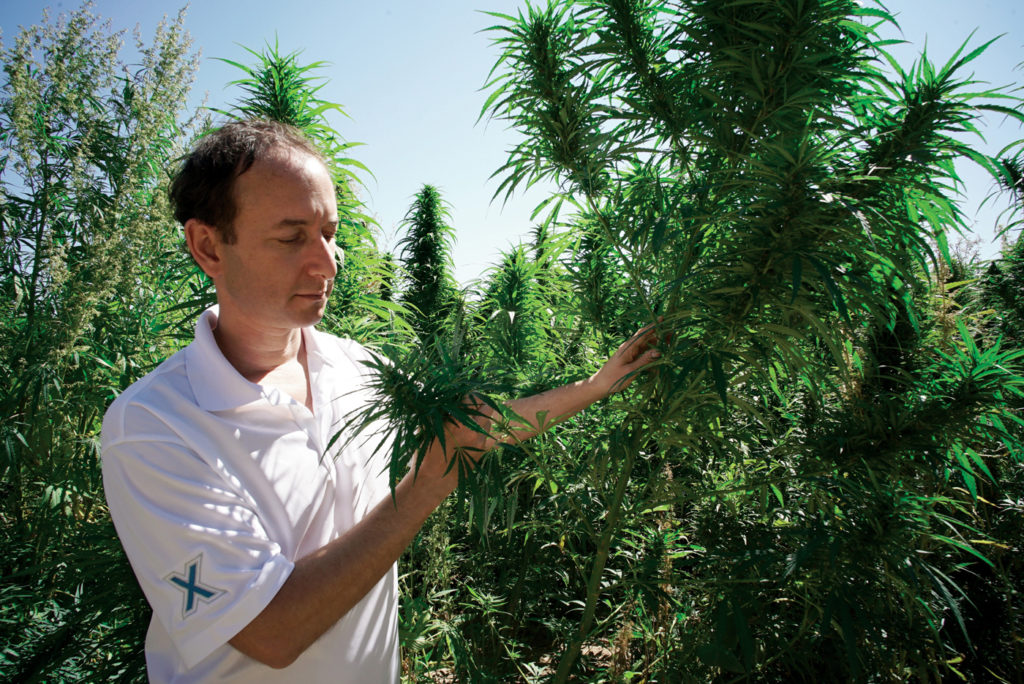Elixinol Global Limited founder and Chief Executive Officer Paul Benhaim doesn’t think of himself as a cannabis visionary, though he very much is. Instead, he considers himself a crusader for health.
Benhaim’s journey to the top of the CBD, hemp, and medical marijuana movement had a somewhat unusual start: As a young man in London, he took an early interest in food and nutrition, particularly in indigenous diets. His devotion to cannabis’s healing potential began with a global odyssey to study how people lived and what they ate.
“I saw people suffering from a number of symptoms” of dietary deficiencies, he said. “That got me onto omega-3 and omega-6,” the essential fatty acids found in many foods including fish, meat, eggs, flaxseed, and hemp. “I saw people in Asian cultures who were living in shit, but they were the healthiest, most vibrant people I’d ever met because they ate natural, whole foods.”
He studied. He learned. “It was the science that led me to the [cannabis] business,” he said.
That business started when Benhaim became the first seller of hemp-derived food products in Europe. Eventually, he landed in Australia with plans to expand where the soil was rich and arable land plentiful. When the country’s restrictive laws stymied his goal, he worked as a consultant and wrote a slew of books about his favorite subject. He returned to his original task as soon as he could, founding Elixinol Global, which now has operations worldwide and in 2017 logged $13 million in sales. By far the biggest piece of the company is its U.S. operation, Colorado-based Elixinol USA, which makes nutraceutical CBD products.
Benhaim also heads Hemp Foods Australia, which makes a variety of hemp-based consumables and skincare products, and Elixinol Australia, where the goal is to offer what the company calls “pharmaceutical-grade medicinal cannabis.” The latter outfit is the newest and is seeking licenses and conducting clinical trials. The Australian operation is the most “medical” of Benhaim’s companies and hopes to develop treatments for a number of ailments from ADHD to cancer.
The U.S. company has thrived, as has the foods business, and things finally are looking good for Elixinol Australia. That’s quite a change from three years ago, when Benhaim despaired the Australian division would never become fully operational, thanks to the country’s regulatory atmosphere. Despite brand-new-at-the-time national legislation allowing cultivation of medical cannabis, Benhaim feared some Australian states, including his home-base of New South Wales, would ban sales and consumption. Thankfully, what could have been a worst-case scenario didn’t develop. Regulation eased and today Benhaim is far more optimistic about Elixinol’s future in his adopted country, as well as the company’s operations in South America, Japan, and elsewhere.
The science behind CBD is still in its formative stages, thanks largely to government cannabis prohibition in countries like the United States, where such research is all but impossible. Nevertheless, Benhaim is a true believer in many of the anecdotal claims about cannabis efficacy. Cannabinoids, flavonoids, and terpenes offer tremendous potential benefits, he indicated. But he’s most excited about what drew him to the plant in the first place: omega acids. Those constituent compounds sparked his desire “to get hemp to as many people as possible.”
A fair amount of science supports the curative and prophylactic value of omega acids. Though not quite incontrovertible, research has produced strong evidence the compounds can help prevent ailments including cancer and heart disease. Researchers worldwide are working feverishly to solidify the science, but Benhaim already is convinced. “There is a direct correlation,” he said. “This is not a theory.”
Paul Greenberg, Pew Fellow in Marine Conservation, raises serious questions about the sustainability of seafood-derived omega acids in his new book, The Omega Principle: Seafood and the Quest for a Long Life and a Healthier Planet, lending possibly unintended support for Benhaim’s position that cultivating cannabis is a healthy practice for people, animals, and the planet as a whole. “Whole-plant medicine works better [than other omega-3 sources],” he said.
In fact, Benhaim said, producing products that hew as closely as possible to nature is an Elixinol imperative. While Elixinol, like every other CBD manufacturer, makes its products with extracted components, the company’s researchers constantly study how those components complement—or, sometimes, counteract—one another in the human body. “We’re getting a better idea of how they all work together, and we make our products with that in mind,” he said. Developing a firmer grasp on the science will consume a large part of the U.S. $14 million the company raised in early 2018 with an Australian initial stock offering. Another large chunk is earmarked for expanding Elixinol Australia.
Meanwhile, Elixinol USA saw its revenues jump by 86 percent from 2016 to 2017, and Benhaim said the division is poised for even more growth. The company recently struck a deal with Kersey Agricultural Company, a sizable farming outfit in Colorado. The joint venture, called North Colorado High Plains Producers, “will secure our supply chain,” Benhaim said, by giving Elixinol more land and access to more water. To support the increase in raw material, Elixinol is doubling its manufacturing capacity in Boulder, its home base.
Such growth is necessary if Benhaim wants to stay ahead in an increasingly competitive market. It looks like he’s making healthy moves to do just that.

